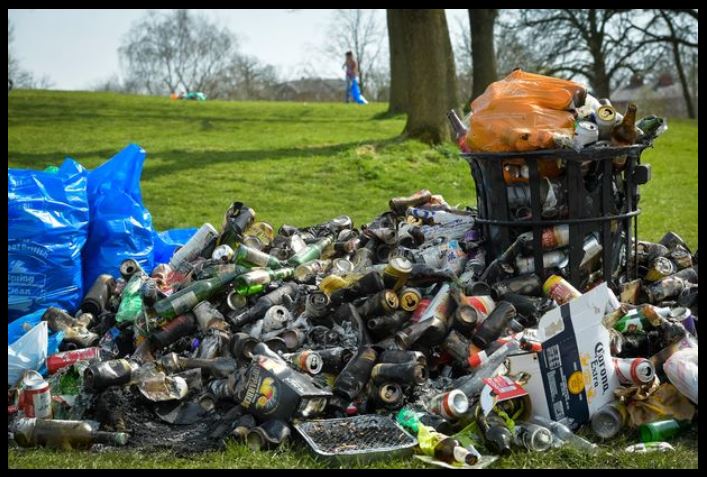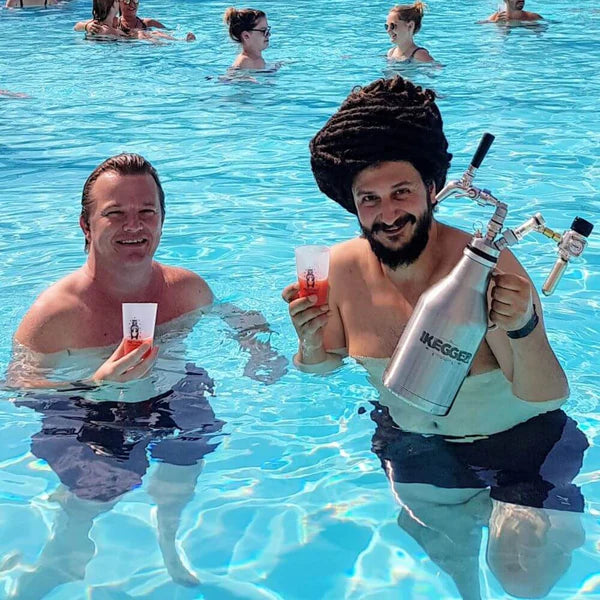
Refilling vs Recycling

These Are The iKegger Founders
We are 2 mates (Dave on the left, Oner on the right) who met working as chefs nearly 20 years ago. One of the places we worked in together was a craft beer bar that filled growlers.
3 things combined to spark the idea for the prototype iKegger while we were working there.
- The growler filling had a bunch of issues: wastage, broken bottles, limited shelf life, contents getting warm, etc.
- When the bar was packed the wait was often up to 20min to get a drink.
- The amount of rubbish (bottles, cans and their packaging) that piled up at the bins every day was ridiculous.
iKegger mini kegs fix all those issues and a bunch more but let's talk rubbish. Like we usually do after a few drinks.
Refilling Vs Recycling
Do You Know What These 3 Arrows Symbolise?
Most people, once they hear the words, know that the 3 arrows represent the words Reduce, Reuse and Recycle.
These are the 3 things that individual people can do to reduce their impact on the environment as much as possible.
However, what many people don't think about is that they are arranged in order from most to least effective in terms of how much pollution they prevent.
Especially common is using Reuse and Recycle interchangeably when actually they are very different things!
So... What Do They Really Mean?
Reduce - This really just applies to everything. Modern people consume so many resources unneccessarily for convienience or simply because they don't realise the damage their actions have. Using less products of any sort means less production / manufacturing pollution, less transport emissions, less packaging rubbish. It doesn't matter if the product is a plastic bag while shopping or an apple that just gets thrown in the bin rather than eaten. Reducing is by far the best thing we can do for the environment.
Most people think of plastics when they hear the word REDUCE and plastics are where we can really do better. Australia is the second highest producer of waste per capita in the world (after the USA) producing on average 690kg of landfill per person, per year. That's enough to cover Victoria, every year.
Australians used 5.66 BILLION plastic bags in 2016-17.
The amount of fossil fuels used in the production of 8.7 single use plastic bags is the same as it takes to drive an average car 1km (According to the 2002 Nolan ITU Report for Environment Australia on Plastic Shopping Bags - Analysis of Levies and Environmental Impacts).
Only 3% of plastic bags are recycled in Australia.
Those 3 facts together leave us with the figure that, with the recycled bags removed, 1,188 plastic bags per second are going into landfill or the ocean in Australia, all day, everyday.
In non-renewable fossil fuel usage that is the equivalent of one car driving 136km per second around australia constantly. That sounds fast but it's just one car I hear you say...
If we convert that one car going super fast into cars going a steady 50km/hr we get 10,000.
That means we throw plastic bags into landfill or the ocean with the same amount of fossil fuel locked into their production as 10,000 cars driving at 50km/hr. Every second of every day.
Reuse - Of those things we can't reduce in our lives (no one is saying you shouldn't buy food or clothes or luxuries when you feel you need to!) the second best thing we can do is reuse them. Whether that is reusing shopping bags, shipping pallets, clothes or anything else. Reusing means taking a product that has all those production, shipping and packaging pollutions attached to it's existence and instead of simply disposing of it finding a way to continue it's lifecycle. Reusing a plastic bag is a no brainer, selling old clothes or donating them instead of throwing them out is reusing. Turning an old shipping pallet into a coffee table takes more work but it is what all the cool kids are doing. By reusing an item rather than disposing of it you are preventing landfill, wastage and production pollution of the replacement product that would be purchased/used instead.
This is where iKegger comes in, we make our mini kegs to last a lifetime, literally. They are stainless steel and will be here long after you and I have departed (but can be 100% recycled into something else at any point). It's not the best business model out there but one stainless steel mini keg replaces up to 30 cans or botttles, their packaging, shipping emissions etc per refill, forever.
We think that's a better idea than selling something that's designed to break 2 weeks after the 1 year warranty runs out, although our bank manager might not agree.
Recycle - Recycling is when items are broken back down to their components and remade into something else. Aluminium is a great example of this, it uses 95% less resources to recycle an aluminium can back into a new can than it does to create one from scratch! Which sounds great until you realise that 10% of all the electricity generated in Australia is used to produce aluminium. It is a hugely energy hungry process so 5% of it is still a huge amount.
Even worse is when we look at how a can is produced or recycled.
The first time a can is made it goes something like this:
Bauxite (aluminium ore) is mined in Australia, we produce about 30% of the bauxite in the world.
1/4 of that ore we ship direct to China. For the other 3/4 we use 10% of our entire countries energy to turn into Alumina (a white powder that is smelted to produce aluminium). 90% of this Alumina is exported to China.
In China the ore and alumina are smelted into pure aluminium bars.
The bars are trucked to factories that form them into sheets
This is trucked to factories that turn it into cans.
The cans are packed onto pallets (approx 5-7000 per pallet) and wrapped in plastic to hold them together.
The pallets are packed into shipping containers and trucked to a port where they are loaded on a ship and sent back to Australia.
Breweries and other beverage manufacturers buy them so they are trucked out to them to be filled.
The brewery unwraps the pallets, throws out the packaging and usually about 5-10% of the cans that have been damaged in transit.
After filling them the cans are labelled and usually packed into plastic 4 pack holders, these are put into cardboard boxes.
The boxes are then put back onto plastic wrapped pallets to be sent out to bottleshops etc.
The retailers unloads them, throws away the plastic wrapping and some of the cardboard boxes and puts them out for sale
We come in and buy our cans, either indivdually, with a plastic 4 pack or in a box of multiple plastic 4 packs and take them home.
We throw out the plastic and cardboard (or hopefully reuse / recycle it)
We drink the beverage and hopefully put the can into the recycling bin, it is the easiest item to recycle after all!
Unfortunately despite this only around 56% of the cans sold in Australia are recycled, the rest end up in landfill or the natural environment.
Our recycling bin is picked up by a truck and taken to a sorting centre where machines and people get most of them seperated from other items in the bins.
The scrap aluminium is crushed into blocks, packed in containers, trucked to ports and 95% of the 56% that's been recylced is shipped back overseas to be melted back down into pure aluminium.
The missing 44% that's ended up as rubbish is lost and replaced by newly mined ore to create the same number of cans.
And repeat....
As you can see, while recycling is hugely beneficial to the environement (even with all those steps above don't forget that 95% less electricity, water and fossil fuels are used to recycle a can than to produce a new one!) reusing a single vessel over and over again without any further environmental impact is FAR better for the world.
